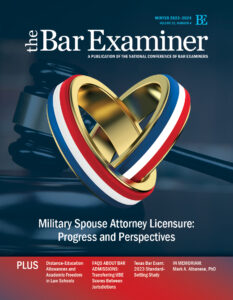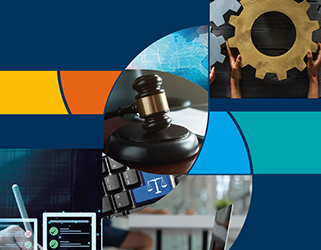This article originally appeared in The Bar Examiner print edition, Summer 2019 (Vol. 88, No. 2), pp 3–5.
By Judith A. Gundersen
ABA Standard 316; BarNow™ and Other Initiatives to Support the Law-Student-to-Lawyer Pipeline; Millennials, Gen Z, and Their Smartphones
Revisions to ABA Standard 316 Tighten Accreditation Standards
In May, after years of debate, the Council of the ABA Section of Legal Education and Admissions to the Bar adopted revisions to Standard 316 of the ABA Standards and Rules of Procedure for Approval of Law Schools. The revised Standard states:
At least 75 percent of a law school’s graduates in a calendar year who sat for a bar examination must have passed a bar examination administered within two years of their date of graduation.
The 75 percent bar passage standard is the same as it was under the previous version of the Standard, but the compliance period is now two years rather than five, and the chance for a school to be in compliance as long as its first-time pass rate in the jurisdictions in which its graduates took the bar exam is within 15 points of the first-time pass rate in those jurisdictions has been eliminated.
Gregory Murphy, a member and former chair of the ABA Section Council, discusses the decision in favor of these revisions in greater detail, so I refer you to that article for further explanation, but I will note that NCBE’s Board of Trustees supported the revisions.
This news came at a time when the February MBE mean scores had increased in most jurisdictions over last February (see this issue’s Testing Column).
While many in the admissions community support this revised Standard for its clarity to consumers of legal education, some, particularly those in the legal academy, have expressed concerns about whether the revised Standard will create hardships for “opportunity” schools, whose student populations often reflect the best hope for a more diversified profession. These law schools have a mission to admit students who might not get into other schools due to lower LSAT scores and lower UGPAs. On paper, these students are at higher risk of not passing the bar exam. Will the revised Standard 316 increase the possibility that these opportunity schools might be less inclined to take a chance on “at-risk” students for fear of falling out of compliance? (Note that the revised Standard applies only to a law school’s combined student population—not to individual students who might sit for the bar exam beyond two years from graduation.)
No one—not in the admissions realm or in legal education—wants opportunity to dry up for students that law schools have identified as having the potential to pass the bar exam but who enter law school with credentials that might not immediately signal bar exam success. Likewise, no one—especially those students—wants to sit repeatedly for the bar exam without success. That is not the kind of opportunity envisioned.
It is no accident that this issue of the Bar Examiner profiles bar preparation/academic support programs at five law schools that are making a difference in student outcomes on the bar exam. Each takes a slightly different approach, but the common theme is early intervention and adequate preparation.
At our Testing Task Force listening sessions held over the past six months, however, we heard repeatedly that too many law students cannot afford the cost of a commercial bar preparation course. So how does someone adequately prepare if he or she cannot afford high-quality study materials?
BarNow™ and Other Initiatives to Support Everyone in the Law-Student-to-Lawyer Pipeline
NCBE is committed to making affordable, high-quality study aids available to all students regardless of their income. By offering our released, actual test questions at low cost to students studying for the bar exam, we can assist in supporting the law-student-to-lawyer pipeline. Our new mobile-friendly, interactive eLearning platform, BarNow™, launched in March, provides current, authentic MBE, MEE, MPT, and MPRE study materials. Practice question groups are available for as little as $10 for 10 MEE questions and model analyses grouped by subject area. Students who order the Everything Pack get over 900 practice questions for $250. Law schools can also order bulk subscriptions for the simulated multiple-choice exams for classroom use. (If you represent a law school interested in a bulk subscription, please contact our new Licensing Program Coordinator, Lu Riese, at lriese@ncbex.org for more information.)
NCBE is committed to making affordable, high-quality study aids available to all students regardless of their income. By offering our released, actual test questions at low cost to students studying for the bar exam, we can assist in supporting the law-student-to-lawyer pipeline. Our new mobile-friendly, interactive eLearning platform, BarNow™, launched in March, provides current, authentic MBE, MEE, MPT, and MPRE study materials.
We are strengthening our relationship with the Council on Legal Education Opportunity Inc. (CLEO) for another year as part of CLEO’s bar exam success initiative to increase diversity and inclusion in the legal profession. CLEO’s programs support law students from traditionally underrepresented racial and ethnic groups and disadvantaged communities.
We’re also pleased to announce an invitational academic support/bar prep provider conference in Madison in September to help bridge the gap between law school and the bar exam. NCBE Testing staff members will offer guidance on writing high-quality multiple-choice questions that can be used for formative assessment in law school, as well as guidance on grading essays and MPTs and measurement fundamentals. Given the revisions to Standard 316, we hope to provide schools that have bar passage concerns with tools to help them help their students, and we believe the exchange of information will be mutually beneficial to all stakeholders in legal education and bar admissions. After all, law students are the fount of the profession.
Millennials, Gen Z, and Their Smartphones: Generational Shifts in Today’s Law Students and Bar Applicants
Our Annual Bar Admissions Conference is in the books. I’m still reflecting on the inspiring and thought-provoking speakers on the program, and I am so thankful for the speakers, who were universally well-prepared and highly engaging. They ranged from bar admissions staff, justices, and bar examiners to innovative faculty members, researchers, and representatives of our national admissions/employment/legal education affiliate organizations. I also appreciate the many volunteers who helped with the planning and execution of the Conference, especially our Education Committee members, who hail from the District of Columbia, Florida, Kansas, Massachusetts, Minnesota, Mississippi, Ohio, Vermont, and Virginia. The Education Committee is chaired by Suzanne Richards, a member of NCBE’s Board of Trustees, and most ably staffed by Ellen Embertson and Laurie Lutz. Thank you, all! It is a top-rate conference due to your efforts, creativity, and hard work.
Our speakers . . . talked about how current law students and upcoming bar examinees, who grew up with smartphones and Googling information, perceive and navigate a 24/7 “on-demand” environment with information at their fingertips.
One of our plenary sessions was about Millennials and Generation Z. The generational shifts we have encountered in law students and bar applicants—not to mention in our own families and younger colleagues—were discussed and demonstrated during a lively and memorable session. Although I have to confess that I recalled Old Man Rasmussen from my neighborhood who, 20 years ago, yelled at my kids to “get off my lawn!”, the program was certainly not about “kids these days.” It was about real generational differences and how perception, communication, and writing (among other things) vary between Millennials, Gen Z, and the earlier Baby Boomer and Gen X generations. Our speakers, including a Millennial who recently passed the bar exam, talked about how current law students and upcoming bar examinees, who grew up with smartphones and Googling information, perceive and navigate a 24/7 “on-demand” environment with information at their fingertips. The speakers talked about how smartphone use, especially social media use, has affected study habits and even brain biology.
What does all this mean for traditional legal education, bar admissions, and the profession itself? Given the changes we are seeing in the current generation of law students, it is legitimate to wonder how this affects bar exam preparation and the practice of law. It is an exciting time to be involved in bar admissions.
Of course, NCBE’s Testing Task Force (TTF) is looking at how the practice of law is changing and what impact technology is having on the practice. The TTF is working hard to ensure that the bar exam for the future can effectively sample the knowledge and skills needed for competent practice. How much legal doctrine will be included in this digital information age? The TTF has embarked on the practice analysis phase of its three-year study to gather information that will help in considering this question among others. As a part of its practice analysis, the TTF is also considering what personal characteristics and values might be important for competent practice but may not be subject to testing. Who better to impart the importance of diligence, collaboration, cultural competence, integrity, and professionalism than law schools?
I’d like to close with a heartfelt thank-you to two members of our Board of Trustees, Hon. Rebecca White Berch (Ret.) and Michele (Missy) Gavagni. Rebecca is our immediate past chair and, as such, will go off the Board in August. Rebecca was chair during my first year as NCBE president, and she provided a steady hand and good counsel. Missy also has been a strong, steady presence on the Board during a time of a lot of change for NCBE. Missy’s leadership among Council of Bar Admission Administrators colleagues and on our Board is evident. I am very grateful to her for what has been a year of great achievement and collaboration.
Until the next issue,

Judith A. Gundersen
Contact us to request a pdf file of the original article as it appeared in the print edition.
[apss_share]







